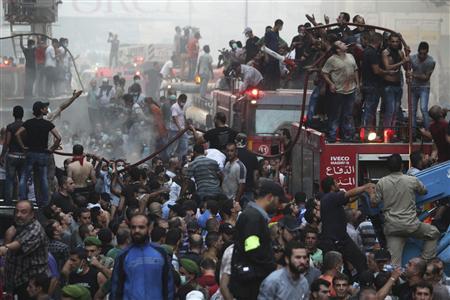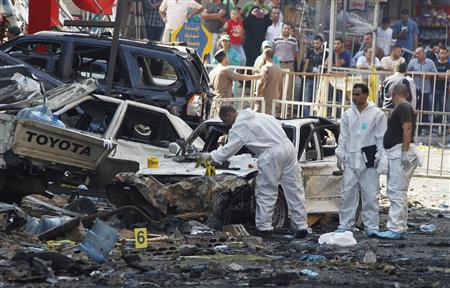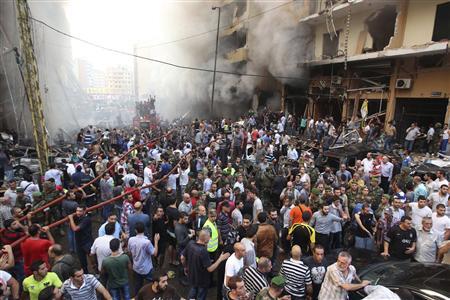www.aljazeerah.info
News, August 2013
Archives
Mission & Name
Conflict Terminology
Editorials
Gaza Holocaust
Gulf War
Isdood
Islam
News
News Photos
Opinion Editorials
US Foreign Policy (Dr. El-Najjar's Articles)
www.aljazeerah.info
|
Editorial Note: The following news reports are summaries from original sources. They may also include corrections of Arabic names and political terminology. Comments are in parentheses. |
24 Lebanese Killed, Hundreds Injured in Beirut Hezbollah stronghold Blast
August 16, 2013
 |
 |
 |
Defiant Hezbollah leader says ready to fight in Syria
By Stephen Kalin and Mariam Karouny
Fri Aug 16, 2013 1:08pm EDT
BEIRUT (Reuters) -
Hezbollah leader Sayyed Hassan Nasrallah accused radical Sunni Islamists on Friday of being behind a car bomb that killed 24 people in Beirut and vowed that the attack would redouble his group's commitment to its military campaign in Syria.
In a fiery speech to supporters, one day after the deadliest bombing in the capital since Lebanon's civil war ended two decades ago, Nasrallah raised the stakes by pledging to join the battle in Syria himself if needed.
Thursday's blast in the Shi'ite militant Hezbollah's south Beirut stronghold followed months of sectarian tension and violence in Lebanon fuelled in part by Hezbollah's intervention against Sunni Muslim rebels in Syria's civil war.
"It is most likely that a takfiri group was responsible for yesterday's explosion," Nasrallah said, referring to radical Sunni Muslim factions linked to al Qaeda, many of whom are fighting with Syrian rebels against President Bashar al-Assad.
"If you think by killing our women and children ... and destroying our neighborhoods, we would retreat from the position we took (in Syria) you are wrong," he said in a combative speech broadcast by videolink from a secret location to his supporters.
"If we had 100 fighters in Syria, now they will be 200. If we had 1,000, they will be 2,000. If we had 5,000 they will be 10,000. If the battle with these takfiri terrorists requires that I and all Hezbollah should go to Syria, we will go."
Thursday's blast came a month after a car bomb wounded 50 people in the same district of the Lebanese capital - an attack that Nasrallah also blamed on takfiris, who consider all but the most radical Sunnis to be infidels whose blood can be spilt.
Defense Minister Fayez Ghosn said a Syrian man had been arrested for suspected involvement in the July bombing, underlining the extent to which Lebanon has become embroiled in its neighbors' conflict.
Lebanese Hezbollah fighters helped Assad's soldiers retake a strategic border town in June, while Sunni Muslims from Lebanon have joined the rebel ranks. The violence has spilled back into Lebanon, with bombings and street clashes in the Bekaa Valley and Mediterranean cities of Tripoli and Sidon.
POSSIBLE SUICIDE BOMBING
Thursday's explosion engulfed a busy street in flames, reviving memories of the destruction inflicted by Lebanon's civil war.
Interior Minister Marwan Charbel said investigators were checking CCTV footage taken in the moments before the explosion to see whether the van believed to have carried the bomb had been driven by a suicide bomber or detonated remotely.
Reporters who arrived at the scene minutes after the explosion saw a burnt-out car near the center of the road, suggesting it was being driven when it blew up.
Among the dead were a family of five - a father, mother and their three daughters - who were killed in their car by the blast, which destroyed several vehicles and set fire to the lower floors of adjacent buildings, trapping residents.
Forensic investigators, emergency workers and security forces were still working at the site on Friday, amid burnt-out cars and charred facades of residential buildings.
Nearby, masked men fired in the air as the first funeral processions of victims of Thursday's explosion drove slowly through the subdued streets of densely populated south Beirut.
As the country marked a day of official mourning, social media was flooded with pictures of the victims, and requests for information about people still missing.
Politicians from across Lebanon's diverse communities, including Sunni Muslims, Christians and Druzes, united to condemn the bloodshed in the Shi'ite neighborhood, some visiting the area to offer condolences.
But in a sign of how the Syrian crisis has polarized Lebanon, there was celebratory gunfire in the mainly Sunni city of Tripoli on Thursday night and reports of people distributing sweets.
In an effort to limit sectarian tensions, Nasrallah called on Shi'ites to show restraint and said that takfiri groups were a threat to Sunnis and Shi'ites alike.
"These people kill Sunnis just as they kill the Shi'ites and they send suicide bombers to Sunni mosques just as they send them to Shi'ite mosques," he said, referring to al Qaeda-linked groups in Iraq, Pakistan and Somalia.
Speaking in an address to mark the seventh anniversary of the end of Hezbollah's 2006 war with Israel, Nasrallah also said he could not exclude that those radical Islamists were actually working for Israeli interests.
(Additional reporting by Laila Bassam in Beirut; Writing by Dominic Evans; Editing by Alison Williams)
Deadly blast strikes Beirut Hezbollah stronghold
AFP, August 16, 2013
By Halla Mohieddeen (video) FRANCE 24 (text)
A powerful explosion struck the southern Beirut stronghold of Lebanon's militant Hezbollah group on Thursday, killing at least 22 people, wounding more than 200 and trapping many others inside damaged buildings, witnesses and emergency officials said.
The blast, a month after a car bomb wounded more than 50 people in the same district of the Lebanese capital, came amid sectarian tensions over the intervention of Shi'ite Muslim Hezbollah against Sunni rebels in Syria's civil war.
Residents of southern Beirut say Hezbollah, backed by Iran and Syria, was on high alert and stepped up security in the area after warnings from Syria rebels of possible retaliation for the group's support for President Bashar al-Assad.
It was not immediately known whether the explosion targeted any Hezbollah figure but it took place in a crowded residential area.
"I don't know what happened. It's as if we were struck by an earthquake," one young man at the scene told Reuters, bleeding from a wound to his stomach.
An online video surfaced shortly after the attack showing three masked men, two of them holding rifles, in front of a white flag inscribed with the Islamic profession of faith.
"You, the pig Hassan Nasrallah, we send you our second powerful message because you haven't understood yet," said one member of the group calling itself the Battalion of Aisha, the Prophet Mohammed's favourite wife.
Another little-known Syrian rebel group, the Special Forces 313 Brigade, claimed that attack and said it was in revenge for Hezbollah fighting alongside the Assad regime. The mainstream rebel Free Syrian Army condemned the action.
At the heart of the site, where fires still raged almost an hour after the blast, the twisted remains of a large van could be seen and some witnesses said they believed the explosion was caused by a car bomb.
Many cars were damaged in the explosion and the blast sent a column of black smoke over the densely populated area. The facades of several residential buildings were damaged. Charred bodies were seen inside cars caught in the explosion.
Al Mayadeen television said some people were still trapped inside apartments at the scene, close to the Sayyed al-Shuhadaa (Martyrs) complex, where Hezbollah leader Sayyed Hassan Nasrallah often addresses his followers.
Hezbollah supporters immediately put up a security cordon around the area, witnesses said.
Huge explosion
"I heard a huge explosion. It threw me several metres," said a woman in her 50s who said she had been talking to her brother in his shop.
"I don't know what happened to my brother. I can't find him," she said, bleeding from wounds to hands and face.
Syria's conflagration has spread to neighbouring Lebanon, where there have been outbreaks of fighting reflecting the renewed sectarian tension now spreading through the Middle East.
Lebanon's Sunni Muslims mostly support the rebels in Syria, while Shi'ites have largely supported Assad, who is part of the minority Alawite sect, an offshoot of Shi'ite Islam.
Hezbollah leader Nasrallah has promised that his group will continue fighting for Assad after it spearheaded the recapture of the strategic town of Qusair in June.
There have been two attacks in southern Beirut this year. Two months before the July 9 car bomb, two rockets were fired into the area.
In October last year, a car bomb in the east of the capital killed a senior intelligence official, Wissam al-Hassan, who was close to the country's leading Sunni opposition party, which has supported the uprising in Syria.
Hezbollah chief blames radicals for Beirut blast
AFP, France 24, August 16, 2013
By Rochelle FERGUSON (video) News Wires (text)
The leader of Lebanon’s militant Hezbollah on Friday blamed Sunni extremists for a string of attacks targeting the group’s strongholds over the past few months, including a car bombing that killed 22 people and wounded more than 300 a day earlier.
Sheik Hassan Nasrallah said all preliminary investigations showed Takfiri groups - a term for Sunni radicals - were likely behind the bombing in a predominantly Shiite southern suburb of Beirut, as well as other recent attacks.
He also pledged to double the number of Hezbollah fighters in neighboring Syria, who have travelled there to support the regime of President Bashar Assad.
“If you think that by killing our women and children ... and destroying our neighborhoods, villages and cities we will retreat or back away from our position, you are wrong,” he said in a speech to supporters marking the end of the 2006 monthlong war with Israel.
“If the battle with these terrorist Takfiris requires for me personally and all of Hezbollah to go to Syria, we will go to Syria,” he said, drawing thunderous applause from thousands of supporters gathered in a village in south Lebanon bordering Israel. The crowd watched him speak on a large screen via satellite link.
Thursday’s car bomb struck a crowded street in the Rweiss district in Beirut’s southern suburbs, an overwhelmingly Shiite area and stronghold of Hezbollah. The explosion sent a massive plume of black smoke billowing into the sky, set several cars and buildings ablaze and trapped dozens of residents in their homes for hours.
The bombing was the second in just more than a month to hit one of the Shiite group’s bastions of support, and the deadliest since 1985 when a blast in the area killed 80 people. Many in Lebanon see the attacks as retaliation for Hezbollah’s armed support for Assad in Syria’s civil war.
The group’s fighters played a key role in a recent regime victory in the town of Qusair near the Lebanese border, and Syrian activists say Hezbollah guerrillas are now aiding a regime offensive in the besieged city of Homs.
Syrian rebels have threatened to retaliate against Hezbollah for intervening on behalf of Assad. Thursday’s car bombing raises the worrying specter of Lebanon being pulled further into the Syrian civil war, which is being fought on increasingly sectarian lines pitting Sunnis against Shiites.
Nasrallah said his response to such bombings will be to double the number of fighters in Syria, if the need arises.
He said the war will be costly, "but less costly than for us to be slaughtered like sheep."
(AP)
Fair Use Notice
This site contains copyrighted material the
use of which has not always been specifically authorized by the copyright
owner. We are making such material available in our efforts to advance
understanding of environmental, political, human rights, economic,
democracy, scientific, and social justice issues, etc. We believe this
constitutes a 'fair use' of any such copyrighted material as provided for
in section 107 of the US Copyright Law. In accordance with Title 17 U.S.C.
Section 107, the material on this site is
distributed without profit to those
who have expressed a prior interest in receiving the included information
for research and educational purposes. For more information go to: http://www.law.cornell.edu/uscode/17/107.shtml.
If you wish to use copyrighted material from this site for purposes of
your own that go beyond 'fair use', you must obtain permission from the
copyright owner.
|
|
|
|
||
|
||||||


